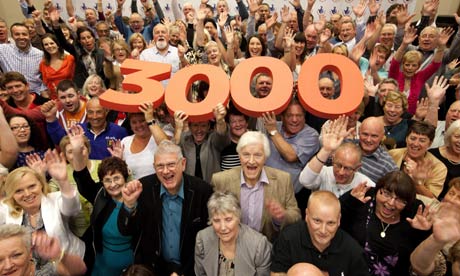Lottery millionaires each fund six jobs a year, study shows
3,000 £1m-plus winners have created another 3,780 millionaires among family and friends and contributed £750m to GDP

Some of the National Lottery's 3,000 millionaire winners. Photograph: David Parry/PA
The balls have dropped and all six numbers match, so it's time to buy that Audi, book the holiday in the US and phone the estate agent. At least, that's what most lottery millionaires do, according to an analysis of spending and investment by jackpot winners.
Since its launch in 1994, the lottery has created 3,000 millionaires who have won more than £8.5bn in total, at an average of £2.8m each. The trickle-down effect means that between them they have created a further 3,780 millionaires among their children, family and friends, according to the forecasting consultancy Oxford Economics.
Most winners (59%) give up work straight away, but 19% carry on doing the day job and 31% do unpaid voluntary work. The good news for the economy is that 98% of winners' spending remained in the UK. Through their spending on property, vehicles and holidays, it is estimated that each winner keeps six people in a full-time job for a year.
Winners have contributed almost £750m to GDP, and generated more than £500m in tax receipts for the Exchequer. The bulk of the money went on property, with £2.72bn spent on winners' main properties, and £170m in paying off existing debt and mortgages.
Maintaining income was a priority, with £2.125bn spent on investments. Gifts to family and friends accounted for £1.17bn, and £680m was spent on cars and holidays.
The study, commissioned by Camelot to mark the 3,000 winners milestone, was based on research from 100 £1m-plus winners. It found that in total the 3,000 winners have purchased 7,958 houses or flats in the UK, or 2.7 each, spending £3.3bn. Most winners (82%) changed their main residence, spending an average £900,000.
The new home is likely to come with a hot tub, with almost a third (29%) putting that on their shopping list. A walk-in wardrobe was a must for 28%, almost a quarter (24%) opted for a property behind electric gates, and 22% had a games room, with 7% installing a snooker table.
Larger properties need maintaining, and 30% of winners employed a cleaner and 24% a gardener. A small proportion (5%) employed a beautician.
Audis were the favourite cars of 16% of winners, with Range Rovers and BMWs also popular purchases (11% each), as well as Mercedes (10%) and Land Rovers (5%). Winners spent £463m on 17,190 cars, with the average price of their favourite being £46,116.
Holidays were also a priority. The majority (68%) choose five-star hotels overseas. The US was the favoured destination for 27%, followed by the Caribbean (9%). Closer to home, however, UK caravan sales have benefited. Over the past 18 years, 10% of millionaires have bought a caravan, generating sales worth about £7.4m.
Some winners (15%) have started their own businesses, 9% have helped others to do so, and 6% have invested in or bought other people's businesses. Businesses started or supported by lottery winners employ 3,195 people, according to the study.
Andy Logan, co-analyst and author of the report, said: "The effect of a win spreads much further and wider than we anticipated. Not only does it transform the lives of friends and family, but each win has a measurable effect on the UK economy, especially with so much of it being spent in the UK. The use of each win creates a ripple effect across this generation and very often the next."
No comments:
Post a Comment